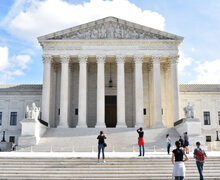Anthony Broadwater files unjust imprisonment suit against New York state
Jaden Chen | Asst. Photo Editor
The lawsuit refers to cross-racial identification as a complicating factor and claims egregious police and prosecutorial misconduct. Broadwater maintained his innocence ever since his conviction, the lawsuit says.
Editor’s Note: This story contains mentions of rape.
Get the latest Syracuse news delivered right to your inbox.
Subscribe to our newsletter here.
Anthony Broadwater, the man who was falsely convicted in 1982 for the rape of then-Syracuse University freshman Alice Sebold and wrongly imprisoned for 16 years, filed a lawsuit Friday against New York state for wrongful conviction.
The lawsuit claims “egregious” police and prosecutorial misconduct leading up to the trial and seeks $50 million for unjust conviction and imprisonment and a list of damages including loss of wages past and future, mental and emotional suffering and loss of family contact and consortium.
Broadwater was exonerated for Sebold’s rape in November 2021 after a reexamination proved inconsistencies in key evidence and deemed the DNA microscopic hair analysis tying Broadwater to the crime unreliable. Review of police conduct during the investigation of Broadwater’s case was brought about by new information presented in Sebold’s memoir, “Lucky,” which detailed her rape, the investigation and the conviction.
Sebold identified Broadwater on Marshall Street nearly five months after the rape, the lawsuit reads, which led to his subsequent arrest and conviction. Prior to the conviction, however, Sebold identified a different man in a lineup.
When Sebold chose “person number five” in the lineup rather than “person number four” — Broadwater — the lawsuit claims Detective George Lorenz justified the opposing identifications by telling Sebold that she had just been “in a hurry to get out of there.” Assistant District Attorney Gail Uebelhoer falsely stated that Sebold had been manipulated into identifying a man other than Broadwater, the lawsuit alleges.
The lawsuit claims that Uebelhoer suggested to Sebold that the other man she chose in the lineup had been a friend of Broadwater, planted there to confuse her and throw her off track. “He uses that friend, or that friend uses him, in every lineup they do. They’re dead ringers,” Uebelhoer told Sebold according to the lawsuit.
These conversations were first documented in the memoir, the lawsuit says, which was published 17 years after Broadwater’s conviction.
The lawsuit refers to cross-racial identification as a complicating factor and claims egregious police and prosecutorial misconduct. Broadwater maintained his innocence ever since his conviction, the lawsuit says. He had originally requested the lineup in an attempt to vindicate himself. Once foundational evidence to Broadwater’s conviction was dismissed, Onondaga County District Attorney William J. Fitzpatrick joined Broadwater’s motion to have his conviction overturned.
“I am not going to, you know, sully these proceedings by saying I am sorry,” the lawsuit quotes Fitzpatrick. “That doesn’t cut it. This should never have happened. And I will say to Mr. Broadwater that I assure him that it will never happen again.”
More coverage on Anthony Broadwater’s exoneration:
- ‘The Lovely Bones’ author Alice Sebold apologizes to man exonerated for her rape
- Man convicted of raping ‘Lovely Bones’ author Alice Sebold exonerated
- Here’s what students think of Thornden Park’s bad reputation
A number of pieces of legislation that would overhaul New York state’s sentencing laws are on the agenda for central New York organizations that joined to form the “Communities Not Cages” campaigns. Three bills, the Eliminate Mandatory Minimums Act, the Second Look Act and the Earned Time Act aim to end mandatory minimums, amend resentencing laws and reintegrate people in prison back into society, respectively.
When Broadwater’s conviction was overturned, Sebold addressed the systemic issues in the American judicial system which contributed to the wrongful conviction and apologized for her role in his unjust imprisonment in a statement.
“I will continue to struggle with the role that I unwittingly played within a system that sent an innocent man to jail,” the statement reads. “I am sorry most of all for the fact that the life you could have led was unjustly robbed from you, and I know that no apology can change what happened to you and never will.”
“It’s still painful to me because I was wrongfully convicted,” Broadwater said about the apology in a statement to syracuse.com. “But this will help me in my process to come to peace with what happened.”
Published on February 28, 2022 at 12:52 am
Contact Jana: jlseal@syr.edu | @JanaLoSeal





